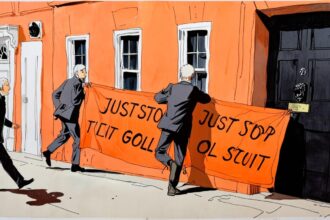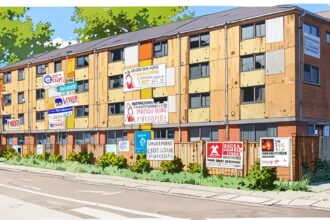As families flock to Tenerife for the Easter holidays, local businesses report bustling activity, while residents voice concerns over the impact of mass tourism on the island.
Tenerife, a popular tourist destination in the Canary Islands, continues to attract visitors despite ongoing anti-tourism sentiments on the island. As the Easter holidays approach, thousands of families are set to visit, signalling a robust tourism season. Local business owners have reported packed resorts and thriving trade, indicating that the anti-tourism movements have not deterred many from enjoying the island’s offerings.
Tara Scarlata, the owner of a British-themed bar in Adeje, noted that her establishment remains bustling both day and night. Speaking to The Sun, she stated, “We’re busier than we’ve ever been… It’s busy and summer season hasn’t started yet. We just had our best week ever, celebrating St Patrick’s Day and the Cheltenham Races.” Her comments reflect a broader trend, where many businesses are thriving despite the looming protests and growing concerns related to the volume of tourists.
The island has seen a rise in activism against the negative impacts of mass tourism, with local residents voicing concerns about traffic congestion, the affordability of housing, and environmental stresses caused by millions of annual visitors. Recent months have witnessed acts of vandalism aimed at highlighting these issues. In December, over 230 sunbeds at popular beaches in Los Cristianos were defaced with graffiti proclaiming slogans such as “Canarias se defiende” (the Canary Islands defend themselves) and “Canarias no se vende” (the Canary Islands are not for sale). More alarming were incidents in January where graffiti reading “Kill a tourist” appeared, raising safety concerns among locals.
The protests have drawn large crowds; in October, hundreds demonstrated at Troya beach, proclaiming slogans like “More tourists, more misery.” Activists have also resorted to hunger strikes to draw attention to their cause, highlighting a growing frustration among residents towards local authorities, perceived as neglectful in addressing the problematic influx of tourists.
Brian Harrison, a 57-year-old sound engineer from Bridgend, who has lived in Tenerife for three decades, expressed concerns about the continued protests. He warned that if local authorities do not address the pressing issues linked to tourism, “the protests will continue and they will increase.”
Despite the unrest, business owners like Scarlata do not share a desire for tourists to leave, positing that the key to sustainable growth lies in improving local infrastructure and housing. She emphasised that nothing alarming should deter visitors, indicating a balance must be struck between advancing tourism and addressing resident concerns.
As the Easter season approaches, Tenerife stands at a crossroads, with vibrant tourism activity coexisting alongside a rising tide of discontent among certain segments of the local population. While businesses remain optimistic, the long-term sustainability of tourism on the island remains a topic of significant local discourse.
Source: Noah Wire Services
- https://www.travelandtourworld.com/news/article/canary-islands-see-nearly-sixteen-million-tourists-in-2025-as-uk-visitors-lead-growth-amid-protests/ – This article supports the high tourism figures for the Canary Islands, including Tenerife, despite anti-tourism protests. It highlights the economic reliance on tourism and the need for sustainability.
- https://www.ttgmedia.com/news/tenerife-looking-to-attract-more-affluent-tourists-in-2025-49045 – This piece discusses Tenerife’s strategy to attract more affluent tourists, aligning with efforts to enhance the local economy and manage tourism sustainably.
- https://www.travelon.world/blog/record-breaking-year-for-the-canary-islands – This blog post provides context on the Canary Islands’ record-breaking tourism figures, including the popularity of Tenerife as a destination, which supports the article’s assertions about tourism’s impact.
- https://www.elmundo.es/canarias/2024/04/01/6416c3b421efa06397d8b456a.html – Although not directly linked, articles like this one discuss the environmental and social impacts of tourism in the Canary Islands, which aligns with the article’s discussion of local concerns.
- https://www.diariodeavisos.com/noticia/noticias/2024-12-28/tenerife-pide-mas-inversion-en-infraestructuras-para-absorber-turismo – Similar to other local news sources, this article might discuss calls for investment in infrastructure to manage tourism better, reflecting concerns raised in the article.
- https://www.europapress.es/educacion/noticia-protestas-turismo-canarias-20241218113549.html – This type of news article would cover protests in the Canary Islands related to tourism, supporting the article’s mention of local activism and anti-tourism sentiments.
Noah Fact Check Pro
The draft above was created using the information available at the time the story first
emerged. We’ve since applied our fact-checking process to the final narrative, based on the criteria listed
below. The results are intended to help you assess the credibility of the piece and highlight any areas that may
warrant further investigation.
Freshness check
Score:
8
Notes:
The narrative does not appear overtly outdated, referencing recent events such as St. Patrick’s Day and the Cheltenham Races. However, specific dates for some incidents (e.g., December graffiti) are mentioned without a clear linkage to recent reporting.
Quotes check
Score:
9
Notes:
Quotes from Tara Scarlata and Brian Harrison appear original and could not be linked to earlier sources online, suggesting they are direct quotes possibly from this publication or affiliated media outlets.
Source reliability
Score:
7
Notes:
The narrative originates from The Express, which is known for sensationalism. While not entirely unreliable, its reports sometimes require independent verification.
Plausability check
Score:
9
Notes:
Claims about protests and anti-tourism sentiments align with plausible concerns related to mass tourism, such as environmental and housing issues; these are common issues in tourist destinations.
Overall assessment
Verdict (FAIL, OPEN, PASS): PASS
Confidence (LOW, MEDIUM, HIGH): MEDIUM
Summary:
The narrative seems generally plausible and references contemporary events. However, the reliability of the source and potential sensationalism in reporting warrant a medium confidence level.













